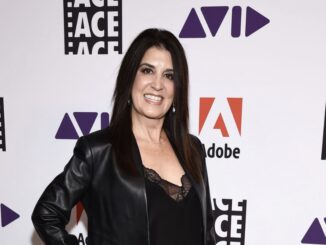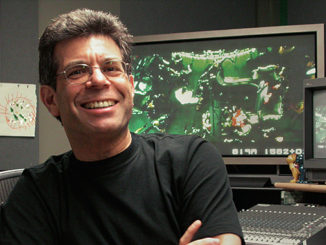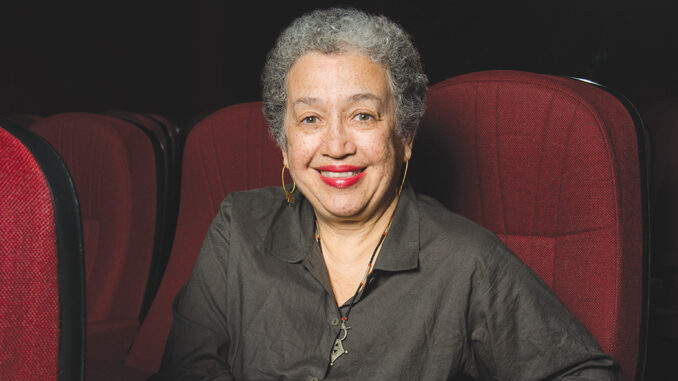
by Betsy A. McLane • portrait by Wm. Stetz
Making a mark on the art of picture editing early in her career, Lillian E. Benson, ACE, continues to create notable work today. She also embodies the profession’s highest personal and collegial standards, the recognition of which is reflected by her selection as the 2017 recipient of the Motion Picture Editors Guild’s 2017 Fellowship and Service Award.
As the editor of two episodes of the milestone PBS series Eyes on the Prize II (1990), she was part of a dynamic group of filmmakers who changed how the public perceived African-American history — and how the film and television industry regarded African-American documentarians. A two-season, 14-part series, Eyes on the Prize remains the definitive non-fiction examination of the Civil Rights Movement in the United States. Created and executive produced by the late Henry Hampton at his Blackside production company, it takes its title from the folk song anthem “Keep Your Eyes on the Prize.” The series remains an evergreen work, used extensively in education and shown on television around the world to this day. It is the work of which Lillian is most proud.
Lillian was championed at Boston-based Blackside by another African-American woman filmmaker, the late Jacqueline Shearer, a successful documentary producer and director, as well as a founding member of the board of directors of the Independent Television Service (ITVS). They were among the very small number of Black women then working in film and television.
Lillian also credits as inspiration Madeline Anderson, the first African-American female in the United States to produce a nationally broadcast television series, PBS’ The Infinity Factory (1978). Anderson also wrote, directed and edited I Am Somebody (1970), a groundbreaking short that examines the intersections among feminism, union activism and the Civil Rights Movement as Charleston, South Carolina nurses fight to unionize.
These influences are important because they illuminate the foundations of Lillian’s career: creating high-quality work, making socially relevant films, fostering others’ successes and believing in union strength as a way to achieve respect and a fair living.
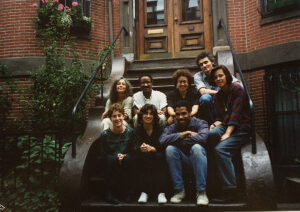
For her 1990 work on the Eyes on the Prize II episode “The Promised Land, 1967-1968” Lillian was nominated for a News and Documentary Emmy for Outstanding Personal Achievement in Videotape Editing. She continued at the top of her field over the next three decades, bringing to Hollywood the same thoughtfulness, intelligence and skill that characterized Blackside’s ethos, along with its commitment to social justice and to opening the filmmaking process to persons of color. She practiced these ideals in and out of the editing room, putting into action principles that others might have ignored — even when that meant working long hours for little recognition.
To call Lillian a film industry trailblazer is an understatement. In 1991, she became the first female African-American member of the American Cinema Editors (ACE), and only the fifth of all Black editors admitted into the society. In 2002, she was elected to a seat on ACE’s Board, buoyed by an e-mail and flyer campaign that demonstrated not only the high regard given her by fellow editors, but also the breadth of her influence. She continues to serve on the ACE Board. In addition to the Emmy nomination for editing Eyes on the Prize, she has contributed to films that have earned four Emmy nominations and four Peabody Awards.
However, film was not Lillian’s first career choice. Born in New York, she holds an undergraduate degree in Fine Arts from the Pratt Institute. There, she made an 8mm movie and claims, “It was the most fun I ever had.” She taught art in a public school in New York, leaving only when a filmmaker friend, Pat Powell, helped her to get two jobs, including one that was shot on 35mm.
One of these early jobs was for New York editor Joe Staton, who had a company that edited commercials, documentaries and independent features. “Working with Joe, I learned how to assist in both 16mm and 35mm,” remembers Lillian. “I stayed there for a little over a year, and also learned about editing room protocol and working with clients.” It was there that she joined the New York editors union, then IATSE Local 771, as assistant editor for Staton on several episodes of Vegetable Soup (1976-77), a television series sponsored by the New York State Department of Education, which was designed to teach children about other cultures.
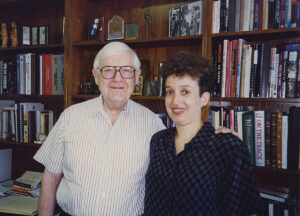
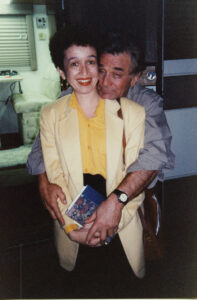
She was also Staton’s assistant on the independent fiction feature The Long Night (1976), a film that was part of a 1970s surge in independent Black cinema in both New York and Los Angeles. Directed by Woodie King, Jr., a major stage producer in Black New York theatre, it presents a picture of Harlem life without exploiting drugs, violence, prostitution or photogenic poverty.
Regarding those early days, Lillian recalls, “Joe Staton was a very patient teacher. Based on his recommendation, one of his editor friends hired me for a sports company, where I stayed for two and a half years and got my first full editing opportunities. Believe it or not, some of my first work was on golf segments.” Staton later became a Hollywood camera person and shot the first film Lillian directed, All Our Sons: Fallen Heroes of 9/11 (2004), a short documentary about Black firefighters who died during the attacks on New York’s World Trade Center.
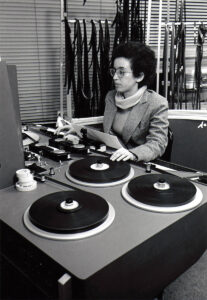
Generosity and mentorship (part of the criteria for the Fellowship and Service Award) are ingrained in Lillian’s life. She shares her time and expertise at ACE, the Television Academy — where she served two terms on the Picture Editing Peer Group — and the Editors Guild on committees, panels and as a subject for the Oral History Program. Utilizing her roots as a teacher, Lillian is especially active in education. She is an adjunct professor at the University of Southern California School of Cinematic Arts, and has been a regular guest lecturer at numerous institutions, such as New York University, Stanford University and Columbia College, Hollywood.
Norman Hollyn, ACE, then Head of the Editing Track at USC, invited Lillian to teach there. “Her editing credentials were impeccable, so there was no questioning that aspect of her teaching,” Hollyn attests. “Many great editors aren’t great teachers because they cannot create those supportive, positive connections with students. Lillian, it seemed, could. A year or two later, I was teaching a class that was later in the curriculum than Lillian’s was, and several of the students in that class had been in her class. Every single one of them had an enthusiasm and a glowing approach to their work that could not have been a coincidence. Their attitude and positivity looked very much like Lillian’s.” She also has plenty of practical advice to offer new editors, including how to quit a job without burning bridges or bruising egos.
Lillian carries her commitment to education outside the classroom. At ACE, Troy Takaki, ACE, who is part Japanese, started a diversity program after Lillian’s informal count found there were fewer than 25 people of color among the active membership of more than 400. She became co-chair of the ACE Diversity Committee, founded in 2015, as Takaki explains, “to create a more diverse editing community that includes more women and minorities.”
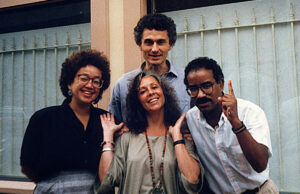
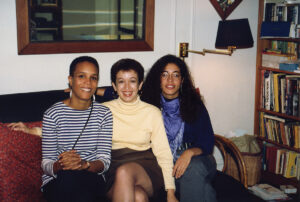
The ACE Diversity Mentorship Program, one of the committee’s projects, builds on the original, almost 25-year-old ACE Internship Program, and accepts applications from any post assistant starting her or his career, or an assistant editor or editor with fewer than 60 months of credits. Those accepted are paired with mentors for six months to one year for support through a combination of craft and work experience sharing, as well as social gatherings.
Lillian credits Oscar-nominated documentary cinematographer/producer/director/writer Jon Else as her major industry mentor. Their friendship dates to the Blackside days, when he was one of the Eyes on the Prize producers, and she edited his A Job at Ford’s (1993), part of Blackside’s The Great Depression series. She also edited the “Ride of the Valkyries” montage in Else’s Sundance Filmmaker Trophy Award-winning documentary Sing Faster: The Stagehand’s Ring Cycle (1999).
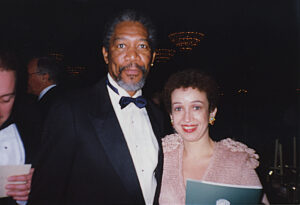
Of Else, Lillian says, “He can give you tough, insightful feedback or advice, and you will take it because he also knows how to genuinely praise your work. Jon is one of those rare directors who knows the value of the editor. Plus, he is smart and kind.” Sing Faster weaves a fascinating and funny fabric of labor issues and high art. In under 60 minutes, it tells the behind-the-curtains story of the San Francisco Opera union stagehands as they rehearse and put on Richard Wagner’s 17-hour opus, Der Ring des Nibelungen.
Else returns the praise, writing, “Over the years, up close and from a distance, I have marveled as she kept her hand on the editorial tiller when all the rest of the production team were coming unglued. But she was never distant, detached or cool to the material. Nerves of steel, heart of gold.”
Love of music is a consistent theme in Lillian’s life and career, one she has explored for decades. She collaborated with Zeinabu irene Davis (who presented her with the Fellowship and Service Award) as writer and editor of Trumpetistically, Clora Bryant (2003), about the Black female West Coast Jazz trumpeter who, among other achievements, was the first American female jazz musician to play in the Soviet Union.
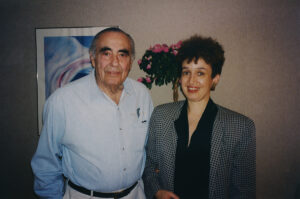
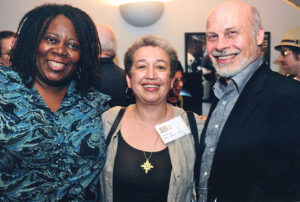
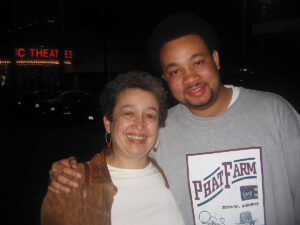
Lillian’s multiple projects with dancer/actress/producer/director Debbie Allen include Hot Chocolate Nutcracker (2012), a
television version of Allen’s original interpretation of the classic story, and the biographical film Life is Not a Fairy Tale: The Fantasia Barrino Story (2006), about a teenage single mother who overcomes a troubled background of sexual abuse and illiteracy to become the winner of American Idol in 2004. Other musical productions Lillian has worked on include the Suzanne De Passe-produced tribute Motown 40: The Music Is Forever (1998), directed by Yvonne Smith and Hart Perry.
A recent passion project Lillian co-produced, wrote, directed and edited is Amen: The Life and Music of Jester Hairston (2013), a documentary about composer, songwriter, conductor, singer, educator and actor Hairston. About her second film as director, Lillian says, “Every type of popular music we listen to today has its roots in the songs of the ancestors: the spirituals. Jester Hairston spread that knowledge as he taught and performed. We are simply carrying the tradition further.” A similar statement could be made about Lillian’s own life; she continues to spread knowledge as she teaches and creates.
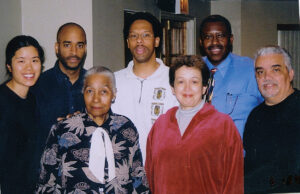
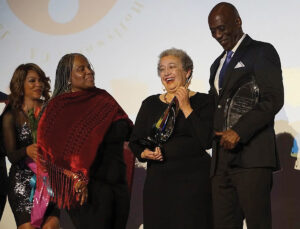
Lest all these credits are not enough, Lillian is also a stalwart editor of major dramatic television series. She brings to these assignments the professionalism, cooperation and dedication that characterize all her editing work. Throughout 2016, she worked on three episodes of Dick Wolf’s Chicago Med on NBC, and continues with the series in 2017. Last year also saw her at work on Oprah Winfrey’s OWN network series Greenleaf (2016), which relates the misdeeds and dark secrets hidden in a mostly African-American megachurch, led by the Greenleaf family. Lillian related her experiences on this job with those who attended ACE’s EditFest, sharing advice on how she got hired for the series and the demands of editing episodic television.
After 20 years in Hollywood, Lillian attributes her success in network episodic drama to “being a little bit stubborn and…hardworking. I don’t take no for an answer,” she affirms. “But it did take a long time.”
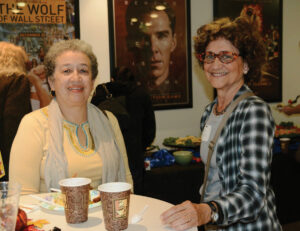
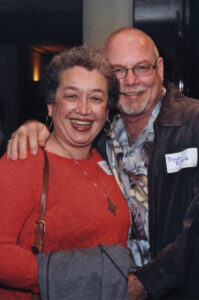
In all genres, Lillian’s editing is conceived in service to the story, the characters and the director’s vision. She rejects the idea that she has a single personal artistic style, preferring to deliver what individual projects require. At ease following a precisely written script, required in stock footage-heavy documentaries like Eyes on the Prize, Lillian can also swing with dance action in Beyond the Steps: Alvin Ailey American Dance Theater (2006). Her work includes formulaic non-fiction television, episodes of A&E’s Mysteries of the Bible (1995-1998), and small, personal films made with no money for “someone who loves me.” She has the chops to make good actors’ performances better and talking-head academics’ pontifications interesting. Lillian is a master of classic “invisible editing” — a rare and valuable skill in the contemporary media world.
Editors themselves are often invisible, alone in the dark. Lillian articulates the emotional difficulties of being an editor in a way that a male counterpart might not grasp or feel comfortable saying aloud. She knows that it is sometimes hard to keep going when no one recognizes, let alone praises, your work. For her, the isolation of being in the editing room and not getting encouragement from directors, producers or even ratings can be the most challenging aspect of the job. Such candor particularly suits her position as a female role model, and partially explains why she is so generous with her time and talents to everyone, regardless of her or his age, race or gender.
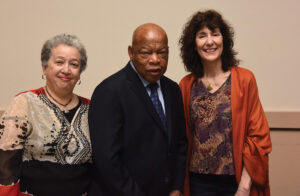
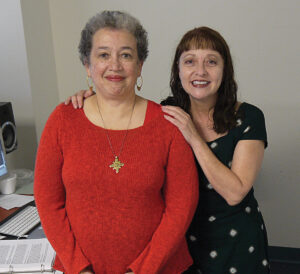
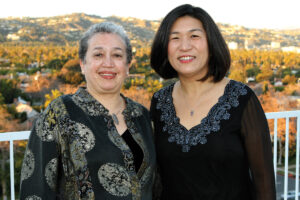
Often, too, women and people of color are “invisible” — even to those in the industry who hire them. Lillian chooses work that fights such prejudices. She recognizes the power of moving images to explain and possibly change the world. That is why she is keen to represent African Americans and women on the screen and also to serve as a real-world mentor.
Generosity of spirit runs deep in Lillian. Just one small example: While dining at one of her favorite San Fernando Valley restaurants, Marmalade Café, recently, she chats with actor Leslie David Baker, best known for his continuing role as Stanley Hudson in the TV comedy The Office (2005-13), who stops by her table to pay his respects. She confides to her lunch date, “I edited his reel for him as a favor. He is so talented; I hope he becomes a star.”
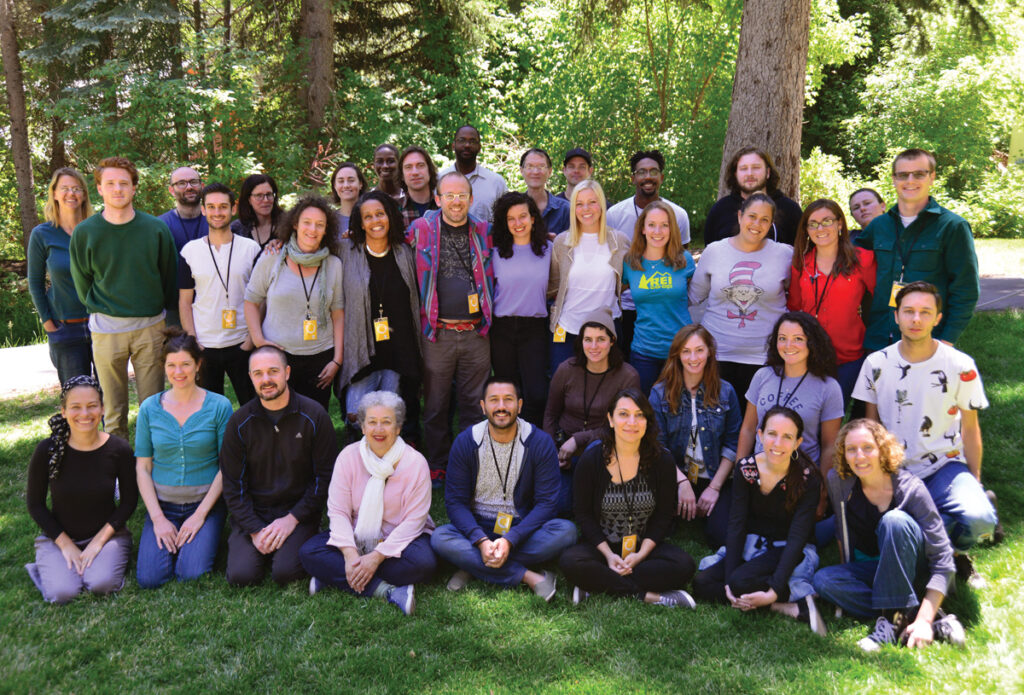
Apparently, she has set him on his way; when Baker heads for the door, he is stopped by two giggling girls who want to take a selfie with him. Few fans may ever request a photo with an editor — even if she is Lillian Benson — but the millions who see her work, and the many who cross her path, will know how significant she is to the field. In her they recognize, as Lillian puts it, “the value of seeing someone who looks like you.”
Lillian E. Benson, ACE Credits
Picture Editing Credits
2016-2017
Chicago Med (TV Series)
2016
Greenleaf
(TV Series, four episodes)
Maya Angelou and Still I Rise (Documentary)
2015
Bird (Short)
Get in the Way:
The Journey of John Lewis
(TV Movie documentary)
Bridging the Divide:
Tom Bradley and the
Politics of Race
(TV Movie documentary)
Progress (Short)
2014
Jean Claude Carrière
(Academy of Motion Picture
Arts and Sciences Tribute Film)
Dancing Like Home
(Documentary short)
Operation Change
(TV Series documentary,
one episode)
(additional editor, uncredited)
Divorce Corp (Documentary)
(additional editor)
Resurrecting Love
(Documentary short)
2013
Amen: The Life and Music
of Jester Hairston
(Video documentary)
Portraits of Faith
(Documentary series)
Tavis Smiley Reports:
Education Under Arrest
(TV Movie)
Power to Heal
(Fundraising promo
for documentary)
2012
A Final Gift (Short)
Hot Chocolate Nutcracker
(BET music special)
ONE Women’s Project
(Non-profit fundraising video)
2011
The Lift
(Short)
Mitchell 20
(Documentary)
Kids in Sport
(Non-profit fundraising video)
2010
Fair Game?
(Documentary)
The Death of Toys
(Short)
Soul of a Nation/Of God and Caesar episode, God in America (TV Series)
2009
Passengers
(Video short)
On the Wings of Penguins
(Video documentary)
We Shall Remain:
Part V – Wounded Knee episode,
American Experience
(TV Series documentary)
The Perfect Beat
(Video short)
Bring Your ‘A’ Game
(Documentary short)
2008
One Bad Cat:
The Reverend Albert Wagner Story
(Documentary)
Alex in Wonderland
(Music special)
James Baldwin, Down
from the Mountaintop
(Filmed play)
2007
Community episode,
Craft in America
(Documentary series)
Wired Science
(TV Series documentary,
four episodes)
2006
Life Is Not a Fairytale:
The Fantasia Barrino Story
(TV Movie)
Dance in America:
Beyond the Steps – Alvin Ailey American Dance Theater
episode, Great Performances
(TV Series)
Shared History
(TV Movie documentary)
2005
Celebrate! Christmas with
Maya Angelou
(TV Movie documentary)
Troop 1500
(Documentary)
2004
Au Pair Chocolat
(Feature)
All Our Sons:
Fallen Heroes of 9/11
(Documentary short)
The Meaning of Food
(TV Miniseries documentary)
2003
Asthma: Fighting to Breathe
(TV Movie documentary)
Diabetes Among Us
(TV Movie documentary)
My Mother’s Keeper (Short)
The Taste of Dirt (Short)
Trumpetistically, Clora Bryant (Video short)
2002
Smothered: The Censorship Struggles of the Smothers Brothers Comedy Hour
(TV Movie documentary)
Man Made (Short)
Soliloquy (Feature)
Roots: Celebrating 25 Years
(TV Movie)
2001
All About You
(Feature)
The Old Settler (TV Movie)
Room 302 (Short)
2000-2001
Soul Food
(TV Series, four episodes)
2000
Conscience and the Constitution (Documentary)
Tunnels: Digging In
(TV Movie documentary)
Bridges: Reaching Out
(TV Movie documentary)
Skyscrapers: Going Up
(TV Movie documentary)
1999
A Century of Living
(HBO documentary)
Sing Faster:
The Stagehands’ Ring Cycle
(Documentary)
(additional editor)
Quantico: The Making of
an FBI Agent
(CNN Reports)
Great Quakes: San Francisco
(TV Movie)
1998
Secrets (Short)
Motown 40: The Music Is Forever (TV Movie documentary)
Death by Hanging
(HBO documentary)
Out at Work
(HBO documentary)
1995-1998
(Staff Editor at FilmRoos)
Ancient Mysteries
(TV Series documentary,
multiple episodes)
Biography
(TV Series documentary,
multiple episodes)
Mysteries of the Bible
(TV Series documentary,
multiple episodes)
Crimes in Time
(TV Movie documentary)
1995
The Revolutionary War
(TV Miniseries documentary, four episodes)
A Litany for Survival:
The Life and Work of Audre Lorde
(Documentary)
(additional editor)
1994
Fire Eyes (Documentary)
Rock n’ Roll Virucide episode,
Superhuman
Samurai Syber-Squad
(TV Series, uncredited)
Victory Over Violence
(TV Miniseries documentary)
Alma’s Rainbow
(Feature)
1993
Dancing
(TV Miniseries documentary)
A Job at Ford’s episode,
The Great Depression
(PBS documentary series)
1991
Prospecting for Planets
episode, The Astronomers
(PBS documentary series)
The Massachusetts 54th
Colored Infantry episode,
American Experience
(PBS documentary series)
1990
The Promised Land:
1967-1968 * and The Keys to the Kingdom: 1974-1980 episodes, Eyes on the Prize II
(TV Series documentary)
Margaret (Documentary short)
Keepers of Eden episode
of Infinite Voyage
(TV documentary series)
1988
NYC Transit Police Authority (Training tape)
1986
Twisted (Feature)
(additional editor)
1980-1986
Various documentaries, sports and corporate films, including Special to the Times
(about The New York Times),
Take My Act, Please
(about comedian
Henny Youngman) and
Hydropower Is Staying Power
1977-1980
The Big Blue Marble
(TV Series, multiple episodes)
Assistant Editing Credits
1993
A Question of Color
(Documentary) (uncredited)
1988
Hemingway
(TV Miniseries, four episodes)
U2: Rattle and Hum
(Feature)
1987
Moments Without
Proper Names
(second assistant editor,
uncredited)
1985
Charlotte Forten’s Mission: Experiment in Freedom episode, American Playhouse
(TV Series)
1984
Zombie Island Massacre (Feature)
Solomon Northrup’s Odyssey episode, American Playhouse
(TV Series)
The Killing Floor episode,
American Playhouse
(TV Series)
(first assistant sound editor)
1976-1978
(Assistant Editor, then Editor, ProTour Productions)
Various sports and instructional films and commercials.
1976
Vegetable Soup (TV Series)
The Long Night (Feature)
Smile Orange (Feature)
1974
Cutting Loose
(Feature documentary)
Directing Credits
2013
Amen: The Life and Music
of Jester Hairston
(Video documentary)
2004
All Our Sons: Fallen Heroes of 9/11 (Documentary short)
1980
Cat Champions and Circus Rider episodes, The Big Blue Marble
(TV Series)
Producing Credits
2009
On the Wings of Penguins
(Video documentary)
(associate producer)
2004
All Our Sons:
Fallen Heroes of 9/11
(Documentary short)
1995
America’s War on Poverty
(TV Miniseries)
(consulting producer)
Writing Credits
2013
Amen: The Life and Music
of Jester Hairston
(Video documentary) (co-writer)
2006
Shared History
(TV Movie documentary)
2004
All Our Sons: Fallen Heroes of 9/11
(Documentary short)
2003
Trumpetistically, Clora Bryant (Video short)
Miscellaneous Credits
2003
His/Herstory (Short)
(consultant)
2003
Brother Outsider: The Life of Bayard Rustin episode, P.O.V.
(TV Series documentary)
(production consultant)
1997
Vaudeville episode,
American Masters
(TV Series documentary)
(production consultant)
1996
Tell the Truth and Run:
George Seldes and
the American Press
(Documentary)
(production consultant)
Honorary Awards
Lifetime Achievement Award –
Black Hollywood Education
and Research Center (2017)
Memberships
Motion Picture Editors Guild
(1975-present)
Diversity Committee
(2015-present)
American Cinema Editors (1991-present)
Board of Directors
(2002-present)
Secretary, Board of Directors
(2006-present)
Co-Chair, Diversity
Mentorship Program
(2015-present)
International Documentary
Association
(2008-present)
Television Academy
(2001-present)
Adjunct Professor,
USC School of Cinematic Arts (2015-present)
* News & Documentary Emmy Award nomination for Outstanding Individual Achievement in a Craft:
Editing – Informational/News



